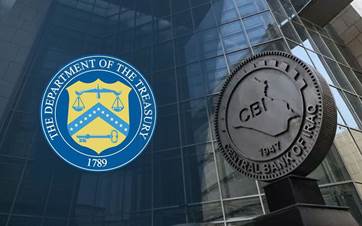ERBIL, Kurdistan Region - United States officials are expected to discuss the issue of resuming Kurdish oil exports through the Iraq-Turkey pipeline during their meetings with Iraqi Prime Minister Mohammed Shia’ al-Sudani in Washington, an energy expert told Rudaw on Saturday.
Oil exports from the Kurdistan Region through the Iraq-Turkey pipeline have been halted Since March 2023 after a Paris-based arbitration court ruled in favor of Baghdad against Ankara, saying the latter had breached a 1973 agreement by allowing Erbil to begin independent oil exports in 2014.
“I think the US is certainly going to raise the issue in the meetings. There is a lot of US political pressure to restart the pipeline and to support the Kurdistan Region in this case,” Robin Mills, CEO of Dubai-based Qamar Energy, told Rudaw’s Mohammed Sheikh Fatih.
Sudani arrived in Washington on Saturday and is set to meet with US President Joe Biden and Secretary of State Antony Blinken on Monday.
Oil producers have asked the White House to pressure Sudani into resuming the oil exports, labeling the meeting with Biden as a “key opportunity” to discuss the exports. The flow of oil is yet to resume because of disagreements between oil producers and the Iraqi government over production costs.
However, Mills said that there are “significant issues” to resolve before the exports could resume and does not expect the meeting to immediately resolve the problem, stressing that Sudani does not have complete freedom to decide to resolve these issues.
When asked about why he thinks the US would raise the issue, Mills said that Washington has always been a stable partner for Erbil and that Biden is seeking pathways to curb rising oil prices to assist him in his election campaign.
“The US has supported Kurdistan consistently for years now. It has been concerned to maintain the autonomy of the Region’s institutions. The Kurdistan Region has had good relations with the US for many years and I think the US sees the Kurdistan Region as a friend to it within Iraq,” he said.
Last month, the Iraqi oil ministry on Monday blamed the international oil companies (IOCs) working in the Kurdistan Region for not reopening the pipeline, stressing that halting the process was not the decision of Baghdad and that the federal government is “the most affected” by the halt in exports.
The ministry was responding to a statement by an IOC association in the Kurdistan Region, and labeled the statement a “blatant interference” in Iraqi affairs.
The IOCs and the KRG are bound by Production Sharing Contracts (PSCs). Under the Kurdistan Region’s PSC model, the IOCs cover the entire cost of production while the KRG receives the lion’s share of the profits from successful projects.
Baghdad has repeatedly said that the PSCs between the IOCs and the KRG are a violation of the Iraqi constitution, stressing that the contracts need to be amended into service contracts such as the ones in federal Iraq before exports could resume.
Mills argued that the constitution has not stipulated that PSC contracts cannot exist.
“I don’t see a reason why they would be in conflict with the constitution. The constitution is quite general on the matter of oil and I don’t see why these contracts would be in conflict with it,” he said.
The expert believes that the pipeline has become a point of leverage in the discussion between the Kurdistan Region and the federal government, as Baghdad realizes it can use its closure against Erbil.
However, its closure also takes away much-needed safety from Iraq’s economy, costing the country as Baghdad needs it to export oil.
“Baghdad can only export today through the Gulf, and the Gulf has security threats. If Baghdad ever couldn’t export through the Gulf … it would be in a huge problem, its exports would be completely cut off. In that case, the pipeline through Turkey is a good backup, a good option to have,” Mills said.
The closure prevents the export of 450,000 barrels of crude oil per day from the Kurdistan Region, costing Baghdad and Erbil billions of dollars in losses.
The loss in oil revenues has severely worsened the Kurdistan Regional Government’s (KRG) economy, and has left the government unable to pay its public sector without assistance from Baghdad.








Comments
Rudaw moderates all comments submitted on our website. We welcome comments which are relevant to the article and encourage further discussion about the issues that matter to you. We also welcome constructive criticism about Rudaw.
To be approved for publication, however, your comments must meet our community guidelines.
We will not tolerate the following: profanity, threats, personal attacks, vulgarity, abuse (such as sexism, racism, homophobia or xenophobia), or commercial or personal promotion.
Comments that do not meet our guidelines will be rejected. Comments are not edited – they are either approved or rejected.
Post a comment